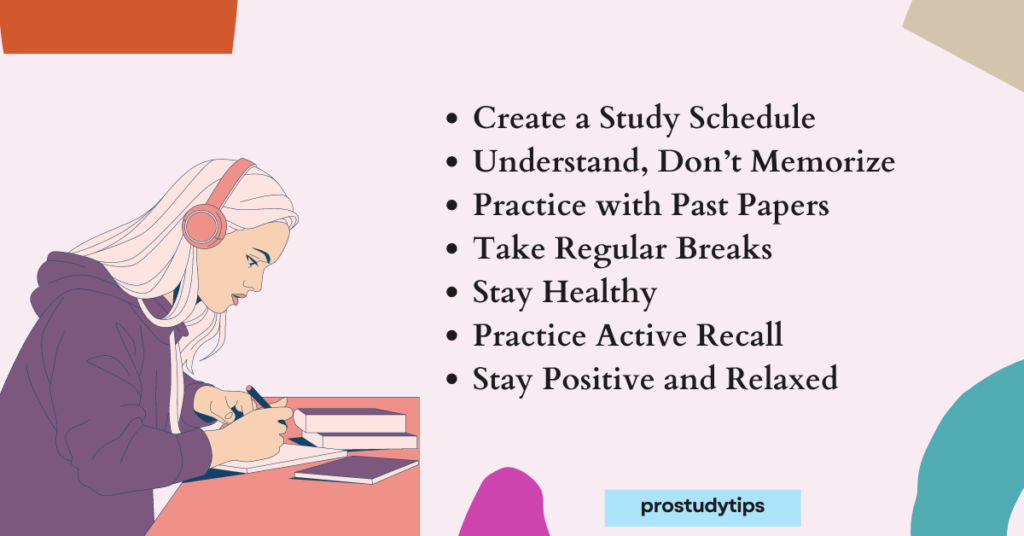Exams can be stressful, but you can easily succeed with the right preparation strategies. In this article, we’ll share comprehensive and easy-to-follow tips to help high school students ace their exams. Whether you’re looking for secret study tips or effective exam preparation methods you can implement at home, we’ve got you covered. Let’s dive in!
1. Create a Study Plan: Your Roadmap to Success
Creating a study plan is the first step to effective exam preparation. A well-structured plan helps you manage your time, covers all necessary topics, and reduces last-minute stress.
- Prioritize Subjects: Identify which subjects or topics require more focus. Allocate more time to subjects you find challenging.
- Set Realistic Goals: Break down your study sessions into manageable chunks. For example, aim to complete a chapter or set of questions within a specific time.
- Incorporate Breaks: Don’t forget to include short breaks. Studies show that taking breaks can enhance focus and retention.
2. Use Active Learning Techniques: Engage and Retain
Active learning involves engaging with the material in a way that promotes deeper understanding. Here are some techniques that can make your study sessions more productive:
- Summarize Information: After reading a chapter, summarize the main points in your own words. This reinforces what you’ve learned.
- Teach Someone Else: Explain the material to a friend or family member. Teaching is one of the best ways to solidify your understanding.
- Practice Past Papers: Working through previous exam papers can give you a feel for the types of questions that may appear.
3. Utilize the Pomodoro Technique: Study Smarter, Not Harder
The Pomodoro Technique is a time management method that encourages focused work sessions with breaks in between.
- 25-Minute Study Sessions: Study for 25 minutes, then take a 5-minute break. After four sessions, take a longer break of 15-30 minutes.
- Reduce Burnout: This method helps prevent burnout by balancing focused work with adequate rest.
- Improve Productivity: Short, timed sessions can increase your productivity and keep you motivated.
4. Optimize Your Study Environment: Create the Ideal Space
Your study environment plays a crucial role in how well you can concentrate and absorb information.
- Minimize Distractions: Find a quiet, well-lit place to study. Keep your phone away or use apps that limit notifications.
- Organize Your Space: Ensure your study area is tidy. A clutter-free space can help clear your mind.
- Comfort Matters: Choose a comfortable chair and desk. Proper ergonomics can prevent discomfort during long study sessions.
5. Master Time Management: Balance Study and Leisure
Effective time management is key to balancing study and leisure, which is vital for maintaining a healthy mindset during exam preparation.
- Create a Timetable: Block out time for each subject and stick to it. Consistency is key.
- Avoid Procrastination: Tackle difficult subjects first when your mind is fresh. Use a timer to stay on track.
- Schedule Downtime: Make sure to schedule time for hobbies, exercise, and socializing to recharge your mind.
6. Leverage Online Resources: Expand Your Learning
The internet is a treasure trove of study resources. From tutorials to interactive quizzes, there’s plenty to help you prepare.
- Educational Videos: Platforms like YouTube have countless educational channels covering various subjects. Videos can make complex topics easier to understand.
- Online Quizzes: Test your knowledge with online quizzes. They’re a fun way to reinforce what you’ve learned.
- Digital Flashcards: Use apps like Anki or Quizlet to create flashcards. They’re great for memorizing key concepts and terms.
7. Practice Self-Care: Keep Your Mind and Body in Top Shape
Taking care of your physical and mental health is essential during exam preparation. Here’s how you can stay sharp:
- Stay Hydrated: Drink plenty of water to keep your brain functioning at its best.
- Eat Nutritious Foods: Focus on a balanced diet rich in fruits, vegetables, and proteins. Avoid excessive sugar and junk food.
- Get Enough Sleep: Aim for 7-9 hours of sleep per night. A well-rested mind is more alert and better at retaining information.
- Exercise Regularly: Physical activity boosts endorphins and can help reduce stress.
8. Practice Active Recall
- Test Yourself: After studying a topic, try to recall the key points without looking at your notes. This helps strengthen memory.
- Teach Someone Else: Explaining what you’ve learned to someone else can reinforce your understanding.
9. Stay Positive and Relaxed
- Manage Stress: Practice deep breathing or meditation to calm your nerves before the exam.
- Believe in Yourself: Confidence can make a big difference. Trust in your preparation and stay positive.

Final Thoughts
- 3 Secret Study Tips: Prioritize difficult subjects first, use active recall, and teach what you learn to others.
- Simple Tips for Exam Success: Stay organized, practice regularly, and maintain a healthy lifestyle.
- How to Study Effectively for Exams at Home: Create a distraction-free study space, follow a routine, and stay disciplined.
By following these exam preparation tips, you can confidently approach your exams and improve your chances of success. Remember, consistency and a positive mindset are the keys to acing your exams!
So be active, take care of yourself, make a plan, and stick to it, other social activities can wait. Trust yourself and do your best.



